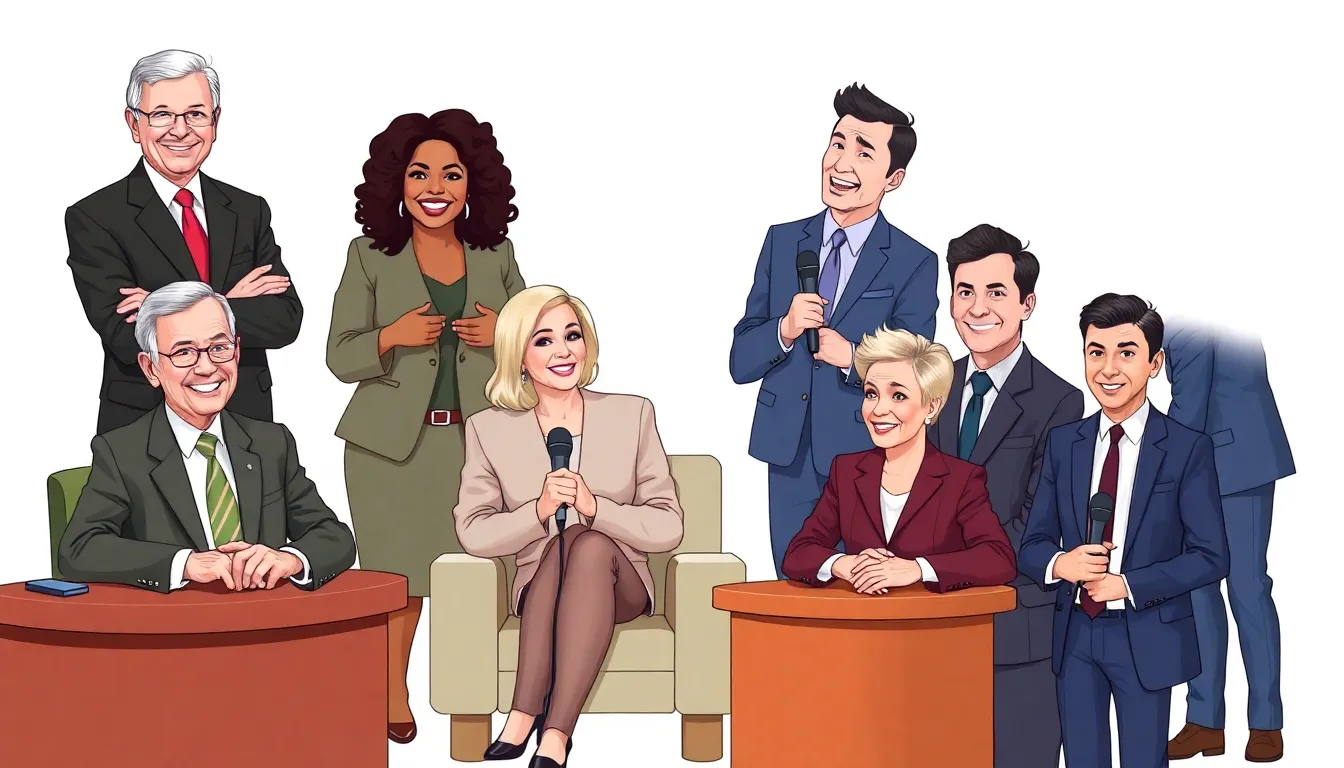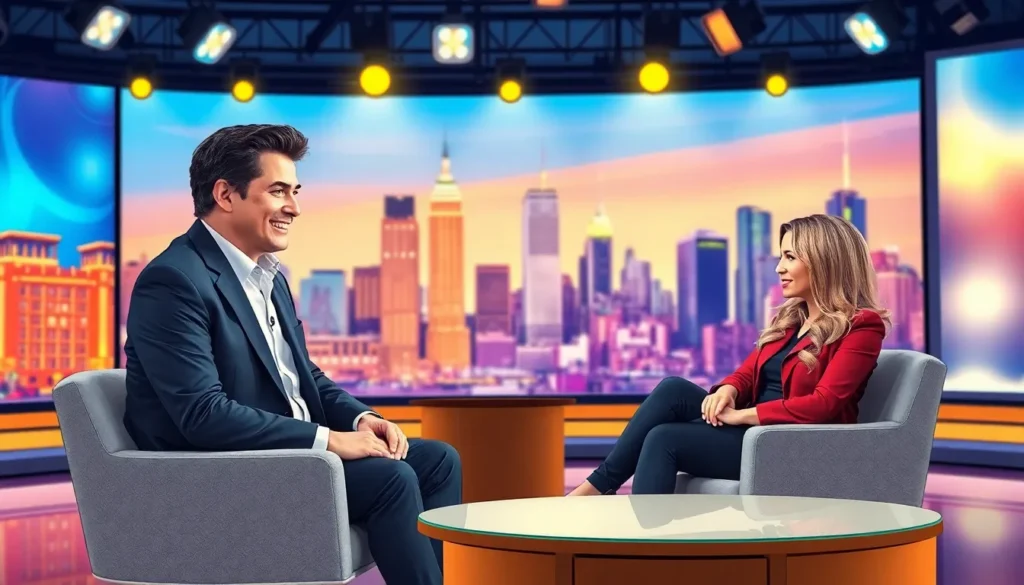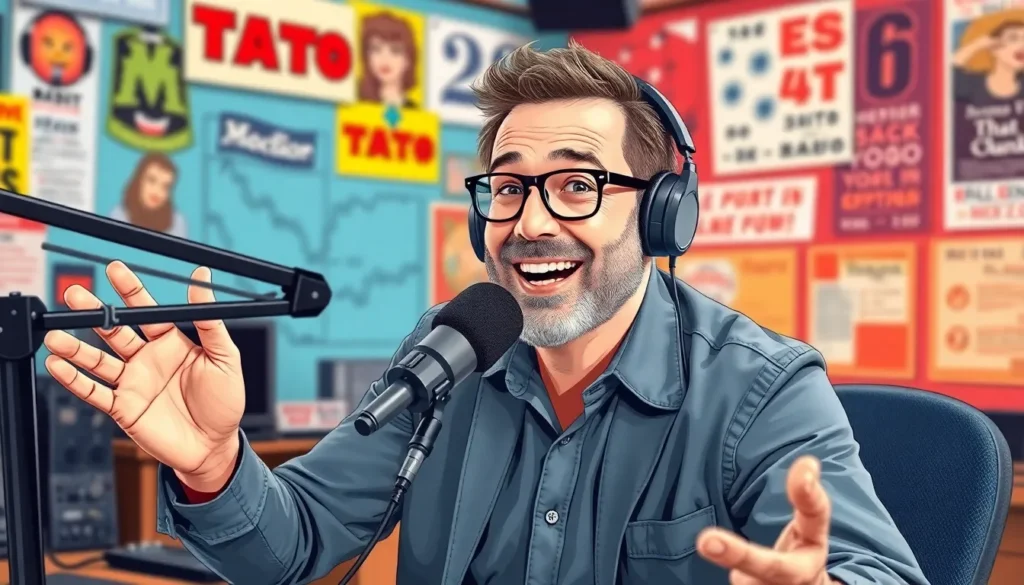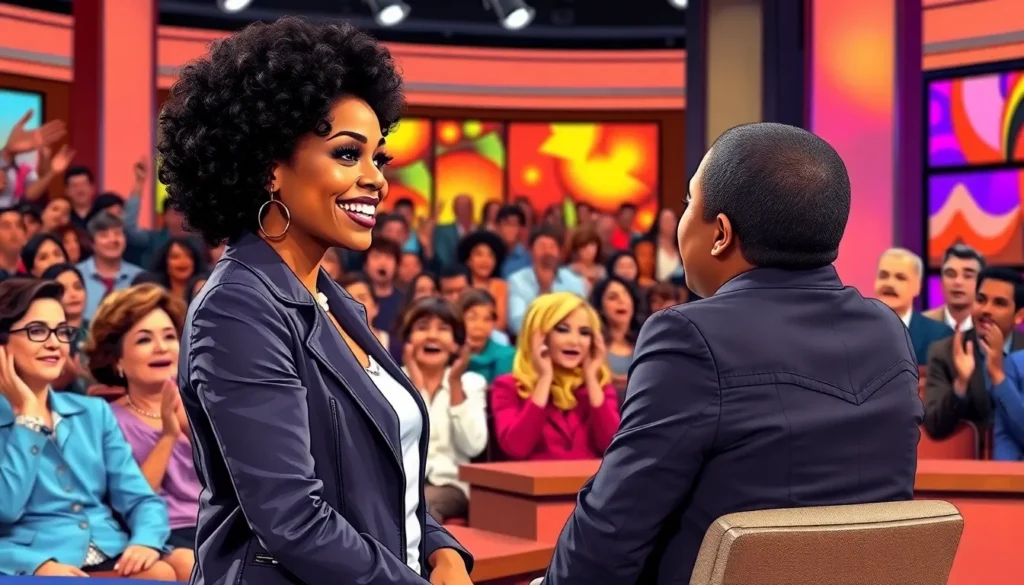Talk shows have a magical way of bringing laughter, tears, and a whole lot of drama right into living rooms. From the iconic late-night legends to daytime chat fests, these shows are the perfect blend of entertainment and insight. They’ve become a cultural phenomenon, where viewers get a front-row seat to celebrity interviews, hilarious skits, and sometimes, jaw-dropping revelations.
Imagine cozying up on your couch, popcorn in hand, as your favorite host navigates through awkward moments and heartwarming stories. Whether it’s a classic like “The Tonight Show” or a fresh face on the scene, talk shows keep audiences coming back for more. They’re not just about celebrity gossip; they spark conversations, inspire change, and sometimes even leave you questioning your own life choices. So grab a seat and get ready to explore the world of famous talk shows that have shaped pop culture and our viewing habits.
Famous Talk Shows
The history of famous talk shows reveals their profound impact on television and culture. These shows have captured audiences’ attention for decades, blending entertainment with substantive dialogue.
Early Beginnings
Talk shows originated in the early 20th century on radio. Programs like “The Gabriel Heatter Show” focused on news and commentary. The transition to television in the 1950s marked a significant shift. “The Ed Sullivan Show” became a staple, introducing new artists and providing entertainment. Pioneering figures such as Steve Allen and Johnny Carson set standards for future hosts, bringing a unique combination of interviews and comedy to the format.
Evolution Through Decades
The landscape of talk shows evolved in the 1960s and 1970s. Hosts like Dick Cavett and Merv Griffin introduced more conversational styles. Their formats encouraged deeper discussions on social issues. By the 1980s, shows such as “The Oprah Winfrey Show” redefined the genre, focusing on personal stories and powerful guest narratives. This era saw the rise of celebrity-centric talk shows, creating a new level of viewer engagement. In the 2000s, late-night formats flourished with hosts like David Letterman and Conan O’Brien, igniting competition and creativity in the industry.
Iconic Talk Show Hosts

Iconic talk show hosts often shape the landscape of television. Their unique styles and memorable personalities contribute significantly to the success of their shows.
Legendary Figures
Johnny Carson remains a seminal figure in talk shows. Through his tenure on “The Tonight Show,” he captivated audiences with charm and wit. Oprah Winfrey transformed the genre with her empathetic interviewing style on “The Oprah Winfrey Show.” David Letterman brought his trademark sarcasm and innovative sketches to late-night television. Ellen DeGeneres, known for her relatable humor, introduced daytime viewers to inspirational moments. Larry King garnered respect for his direct approach to interviewing newsmakers. These figures set standards, influencing future hosts and establishing a lasting legacy in entertainment.
Rising Stars
Stephen Colbert exemplifies a fresh take on political humor in late-night. He engages viewers with sharp satire and interviews those in the spotlight. Jimmy Fallon captivates audiences through fun games and musical parodies, making his show a family favorite. Trevor Noah offers a unique international perspective on current events, blending comedy with insightful commentary. Hasan Minhaj’s “Patriot Act” combines comedy and activism, appealing to younger audiences. Together, these rising stars are reshaping the talk show format, infusing it with fresh ideas and perspectives that resonate widely.
Popular Formats Of Talk Shows
Talk shows encompass various engaging formats that cater to diverse audiences. Two prominent styles stand out: interview-style and panel discussions.
Interview-Style
Interview-style talk shows center around one-on-one conversations with guests. Hosts invite a variety of personalities, including celebrities, authors, and experts, to share insights and stories. This format fosters deeper connections between viewers and guests, allowing audiences to learn from personal experiences. Oprah Winfrey exemplified this approach through her impactful interviews that often explored emotional topics. Shows like “The Tonight Show Starring Jimmy Fallon” also incorporate this style, mixing humor with genuine conversations. Guests often participate in games or comedic segments, keeping the atmosphere lively and entertaining.
Panel Discussions
Panel discussions feature multiple guests engaging in debates or conversations about current events and trending topics. This format encourages dynamic interactions and diverse perspectives among participants. Programs like “The View” showcase women discussing various issues, making room for differing opinions and enhancing viewer engagement. Each panelist contributes unique insights, often leading to spirited debates. This format thrives on real-time reactions and discussions, resonating with audiences who enjoy lively discourse. Ultimately, panel discussions promote dialogue, making them a staple in contemporary talk shows.
Cultural Impact Of Talk Shows
Talk shows significantly shape cultural conversations and societal values. These platforms amplify voices that resonate with audiences across generations.
Influence On Society
Talk shows serve as mirrors reflecting societal issues. They address topics like mental health, race, and gender equality through engaging discussions. For example, “The Oprah Winfrey Show” normalized conversations around personal struggles, leading to greater public awareness and empathy. Programs like “The Ellen DeGeneres Show” contribute to acceptance of LGBTQ+ rights, encouraging dialogue on inclusivity. These discussions foster connections among viewers and inspire social change. They create community platforms for marginalized voices, amplifying their stories and experiences. In this way, talk shows contribute to a more informed and engaged society.
Shaping Public Opinion
Public opinion often shifts in response to messages delivered on talk shows. Hosts possess the ability to influence perceptions through their interactions with guests. For instance, Jimmy Fallon employs humor to create a lighter perspective on serious issues, making them accessible to wider audiences. Trevor Noah tackles current events with a critical eye, prompting viewers to reevaluate their positions. The engagement with various guests allows contrasting viewpoints to emerge, enriching audience understanding. By featuring experts and celebrities, these shows blend entertainment with relevant discussions, guiding public sentiment. Ultimately, talk shows shape narratives that resonate within larger cultural contexts.
Conclusion
Talk shows have carved out a unique niche in the entertainment landscape. They not only entertain but also inform and inspire viewers. By addressing pressing social issues and showcasing diverse perspectives, these programs foster important conversations that resonate with audiences.
The evolution of talk shows reflects changing societal norms and preferences. Iconic hosts have paved the way for new talent, ensuring the format remains fresh and relevant. As the genre continues to adapt, it promises to engage and challenge viewers for years to come.
Ultimately, talk shows remain a powerful medium that shapes public discourse while providing a platform for both laughter and reflection. Their lasting impact on culture underscores their significance in today’s media landscape.



